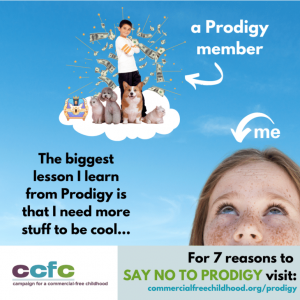For years, the edtech industry has capitalized on tight budgets and offered resources at little or no cost to cash-strapped US schools. School districts struggling to make ends meet have too-often accepted these “gifts” with little vetting of the efficacy of learning tools, adequacy of privacy protections, and social-emotional impacts on children.
Enter Covid and the reliance upon remote learning and the industry saw an opportunity to ramp up its sales pitches and really become entrenched in schools. Campaign for a Commercial-Free Childhood (CCFC) and a coalition of organizations have pushed back and filed a complaint with the US Federal Trade Commission (FTC) saying Toronto-based Prodigy Education has tried to capitalize on the quarantine unfairly with an online math game based on the manipulative “freemium” model.
Virtual swag is social currency in Prodigy
Prodigy is an internet-connected, interactive, gamified math platform where kids’ customized characters explore fantasy worlds and children answer math questions to “battle” opponents.
Prodigy Education has attracted educators and parents by providing a free in-school version of the game and crowing that Prodigy will be “free forever” and “no cost, ever.” That would be misleading even if Prodigy made the claim with an asterisk and a small print disclaimer, because when kids play the free version at home, they are assaulted with ads and persuasive design that relentlessly promote a Premium membership, at a price of 60 to 100 US dollars per year per child. Luring schools and parents by saying Prodigy is always “free,” without even an asterisk? That’s what we would call a “whopper.”
Prodigy also deceptively markets itself to both educators and parents as an effective educational tool, promising to “build essential math skills” and “improve grades and test scores.”
It says it has proof—and points to a Johns Hopkins University report. But that report noted a “lack of remediation and actual teaching provided by Prodigy” and did not substantiate Prodigy Education’s claims to boost children’s math ability significantly. FTC guidance says claims that a product is effective must be true and not misleading, and based on competent, reliable specific evidence—“tests, analysis, research, or other studies that have been conducted and evaluated in an objective manner by qualified persons and are generally accepted in the profession to yield accurate and reliable results.” Prodigy lacks such evidence.

Prodigy is one of the most popular math games used by schools across the country. It’s also one of the most manipulative.
The game is also replete with shopping and social media distractions. The Johns Hopkins research noted: “students spend time dressing their avatar, rearranging their house, traveling or wandering around various rooms or worlds, swapping out tools and/or reviewing options available for purchase with gems.” Virtual swag is social currency in this game.
Children are repeatedly teased with virtual rewards that are only accessible if their family purchases a membership. And the membership push is relentless. CCFC found that, in a given time period playing Prodigy, kids see up to four times more advertisements than math exercises. Even during school hours, members show off their Premium superpowers and other swag, creating two classes of students; bejeweled members sail around on a cloud, while non-members whose families cannot afford a membership literally tromp in the dirt.
TACD members and partners take action
Twenty-two US advocacy groups signed on to the FTC complaint, including several TACD members—Campaign for a Commercial-Free Childhood, the Center for Digital Democracy, Consumer Action, the Consumer Federation of America, the Electronic Privacy Information Center (EPIC), Public Citizen, and U.S. PIRG .
Shortly after the filing, which received prominent news coverage, we started to see results. Jennifer Judkins, the Director of Technology and Innovation for public schools in Woburn, Massachusetts, heard about the complaint, examined the game again, and decided to move Prodigy from their list of approved resources to the “Not Approved” list. I asked Ms. Judkins why she took action.
“As an educator and parent, I care deeply about student data privacy and selecting and promoting technology resources that positively impact student learning,” Judkins told me.
“While free resources are very appealing to budget-constrained school districts, we need to be vigilant about possible hidden ‘costs.’ Prodigy, understandably, needs to generate revenue to fund the development and maintenance of their platform, however, the intensity of advertising and prioritization of addictive gaming features over student learning cannot be overlooked.”
CCFC has launched a social media campaign to empower families to ask their own school districts to pull the plug on Prodigy, including an action page with 7 Reasons to Say No to Prodigy.
What’s next?
Will Prodigy Education see the light? Early signs are not encouraging. James Bigg, a Prodigy Education spokesperson, was quoted by NBC News: “Like all services with subscription models, we do surface the benefits of our membership features from time-to-time to make users aware that memberships exist and what their benefits might be. In all cases, we look to do this responsibly and sparingly so it does not detract from the free gameplay experience or educational quality.”
Let’s get real, Prodigy. Your member benefit pitches aren’t just “surfacing”—they’re jumping out at kids like a hungry shark.
Their excuses show that Prodigy has profit, not kids’ wellbeing, in mind. We hope the FTC will take action and make clear that predatory “freemium” tactics have no place in our children’s education.
Additional resources:
- TACD’s Resolution on Children and E-Commerce
- TACD’s Resolution on Marketing to Children
- CCFC’s action page: 7 Reasons to say no to Prodigy
- Blog: Apps rated appropriate for kids are actually manipulating them
- Blog: FTC complaints filed by Campaign for a Commercial-Free Childhood and Center for Digital Democracy lead to major changes for kids on YouTube
